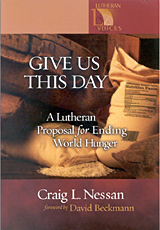Over 800 million people in the world — 153 million under the age of five — are chronically malnourished. Thirteen million children in the United States under the age of eighteen are hungry; 10.4 percent of the U.S. population either experience hunger or are at risk of hunger.
These statistics should shock us, but far too often, we are so caught in our everyday activities, we don't notice what is happening to our neighbors. According to Craig L. Nessan, Academic Dean and Associate Professor of Contextual Theology at Wartburg Seminary, the biblical tradition establishes defense of the poor, widow, orphan and stranger as a fundamental obligation of our faith. The Hebrew Bible (Micah 6:8) reminds us: "And what does the Lord require of you but to do justice, and to love kindness, and to walk humbly with your God." Nessan puts it even more forcefully: "In the Gospels, Jesus says far more about the needs of the poor and oppressed than he does about prayer! This is a surprising claim. It is a discovery that could help correct the potential imbalance between the church's concern for individual piety and its concern for social ministry."
Nessan contends that Christians are called to see that justification by faith and bringing justice alive in the real world belong together. He argues that ignoring the plight of 800 million people is neither normal nor acceptable behavior for those who are "agents of God's justice by power of the Spirit." We must speak out against hunger and advocate for the systemic changes that will alleviate it. Nessan calls upon the members of his denomination, the world family of Lutherans, to give stopping hunger the priority of a matter of status confessionis (a concern of utmost confessional significance), a priority given in 1977 to bringing an end to apartheid in South Africa. After all, believers are expected to respond to every hungry person as he or she would respond to Jesus Christ himself.
There is also another dimension to this issue and that is: "food is a gift of God to be shared freely and generously with those in need. Food is not an optional commodity that only consumers of means should have the ability to purchase. God desires that all people flourish, which at the bare minimum includes an adequate diet, regardless of one's ability to buy. God created food for the sake of human delight, sustenance, and sharing." Nessan concludes with a challenge that all Christian denominations work together with the goal of eliminating hunger in the twenty-first century. He outlines ten steps that will help in this noble project, including evaluating international trade agreements, monitoring welfare programs, promoting more microenterprise credit, and supporting sustainable agricultural practices and usable water supplies. Each chapter ends with questions for reflection and discussion, making this small book a perfect one for study by congregations.
